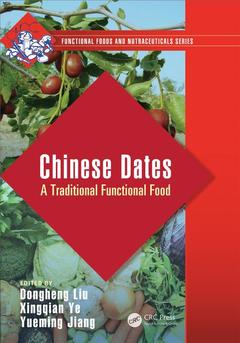Chinese Dates A Traditional Functional Food Functional Foods and Nutraceuticals Series
Coordonnateurs : Liu Dongheng, Ye Xingqian, Jiang Yueming

Chinese Dates: A Traditional Functional Food delivers unique information on Chinese dates (jujubes) as typical ethical foods and traditional health-promoting foods. It conveys a better understanding of Asian food cultures and provides historical information in regard to traditional functional foods and their dietary applications. It discusses the health-promoting benefits of a wide variety of jujube fruits and covers different jujube products, such as jujube fruit juice and cakes. It also looks into the many kinds of jujube fruit-based medicated diets, describes innovative new processing technologies and novel jujube products, and examines ethnomedicinal uses, pharmacological activity, and phytochemical constitutes of jujubes.
The book?s four sections and nineteen chapters provide information on Chinese date?s origin, distribution, varieties, chemical composition, biochemical properties, traditional products and technology, innovative processing technology, food use, and health benefits. The first section explores the origin, distribution, germplasm, and growing conditions of Chinese dates. It also examines traditional jujube-based functional foods from a historical perspective.
The second section looks into the chemical and biochemical properties of Chinese dates along with their health benefits. Topics within this section include a review of the current knowledge of fruit composition; chemical, biological, and antioxidant properties of jujubes from different geographical regions; and a mathematical analysis of the relationship between the composition and bioactivities of jujube fruit harvested at different stages of ripeness. This section also explores ethnomedicinal uses and pharmacological activity, phytochemical constituents and health benefits, and polysaccharide composition.
Chinese date products and postharvest technology are covered in the third section, which includes a discussion of drying technology and postharvest treatments affecting storage quality. The fourth and final section deals with the Chinese date industry in various countries, including Australia, Turkey, Iran, and Romania.
ORIGINAL, DISTRIBUTION, AND GROWING CONDITION OF CHINESE DATES (JUJUBES). CHEMICAL AND BIOCHEMICAL PROPERTIES AND HEALTH BENEFITS OF CHINESE DATES (JUJUBES). CHINESE DATE (JUJUBE) PRODUCTS AND POSTHARVEST TECHNOLOGY. CHINESE DATE (JUJUBE) INDUSTRY IN DIFFERENT COUNTRIES.
Donghong Liu, PhD, is executive director of the Fuli Institute of Food Science, Zhejiang University, China. Dr. Liu graduated from Shanghai Jiao Tong University, China, and earned her master’s degree (1997) and PhD (2006) from Zhejiang University, China. She has published more than 100 peer-reviewed research papers in international journals. She also serves as deputy director of the Non-Thermal Processing Branch of the Chinese Institute of Food Science and Technology, deputy director of the Processing and Storage and Agricultural Products Branch of the Chinese Society for Agricultural Machinery, and a member of the Branch of Packaging and Machinery, Chinese Institute of Food Science and Technology.
Xingqian Ye, PhD, is a professor in the Department of Food Science and Nutrition and deputy dean of the College of Biosystems and Food Science, Zhejiang University, China. Dr. Ye earned his PhD in agriculture products storage and processing from Zhejiang University (formerly Zhejiang Agricultural University) in 1998. He has published more than 200 peer-reviewed research articles in scientific journals and 10 book chapters. He holds 40 Chinese patents and has delivered a number of invited lectures and presentations in international and national conferences. He also has edited four books and a textbook on fruit and vegetable processing for university courses.
Yueming Jiang, PhD, is deputy director of the South China Botanic Garden (formerly the South China Institute of Botany), Chinese Academy of Sciences. Professor Jiang also has been appointed as vice-president of the Chinese Society for Plant Physiology, president of the Guangdong Society for Plant Physiology, vice-president of the Guangzhou Association for International Academic Exchange and Cooperation, and scientific advisor to the International Foundation for Science. Dr. Jiang earned his PhD in 1996 from Zhongshan University. He has published more than 300 peer-reviewed research pape
Date de parution : 06-2016
17.8x25.4 cm
Thèmes de Chinese Dates :
Mots-clés :
Jujube Fruits; Jujuba; Chinese Dates; Chinese Jujubes; Jujube Fruit; Ziziphus Jujuba Mill; Health Promoting Foods; Jujube; Jujuba Seeds; Zizyphi Spinosi Semen; Total Phenolic Content; Jujuba Mill; Vc Content; Cyclopeptide Alkaloids; Jujube Trees; Triterpenic Acids; Pomolic Acid; South Khorasan Province; Total Phenolic; Total Soluble Solids; ELSD; SKBR3 Breast Cancer Cell Lines; Bioactive Compounds; Acetylated Low Density Lipoprotein; Moisture Content; Free Amino Acids; High TPC



